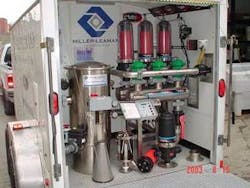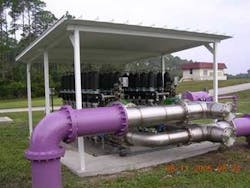Self-Cleaning Filters Keep Reuse Water System Flowing
by Chris Shuster
With hundreds of miles of beautiful coastline and countless bays, rivers and lakes, the sunshine state is a desirable place to work and live. According to Florida Trend’s Economic Yearbook (2006), Florida’s population grows by roughly 1,060 people every day, and is expected to grow to roughly 21 million by the year 2020. This phenomenal growth is certainly beneficial to the state’s economy; however, it comes with a demanding toll on precious natural resources. Every person and business that migrates to Florida is competing for the finite supply of fresh water.
Traditionally, the primary source of water has been groundwater; however, the state of Florida has shown foresight in encouraging the development of alternative water supplies to meet the ever-increasing water demand. Reclaimed water is one of the alternatives and the state of Florida is a national leader in its use. Over 60 percent of all reclaimed water in the state is being used for agricultural and landscape irrigation, with the balance used for ground water recharge, industrial usage (i.e. cooling tower water), etc.
Set on a pristine stretch of Florida’s eastern coast, just south of St. Augustine and north of Daytona Beach, the 2,120-acre Dunes Community Development District in Flagler County (made up of Hammock Dunes, Island Estates, and Ocean Hammock) is a shining example of the efficient use of reclaimed water. This rapidly growing residential and golf course community is bounded by the Atlantic Ocean on one side and the Intercoastal Waterway on the other.
The Dunes Community Development District supplies reclaimed water for irrigation to residential and common areas, as well as two golf courses. Total usage is approximately 1.9 mgd. The reclaimed water is provided by the Dunes Community Development wastewater treatment facility. The reclaimed water coming from Dunes Utilities flows into three lined reclaimed storage ponds, and is then pumped through a purple reclaimed water piping system by three irrigation pump stations.
One problem with the irrigation system was plugging of the sprinklers. Since the reclaimed water is stored in open ponds, the water quality significantly deteriorates when exposed to sunlight and the open atmosphere. One can commonly find sediment, algae, snails, mussels, bloodworms and other creatures present in reclaimed water ponds. Other than a coarse strainer, initially there was no filtration equipment installed on the system, resulting in constant sprinkler plugging.
The first step toward resolving the problem was installation of manual filters in 15 zone locations. This solved the problem of sprinkler orifice plugging; however, the manual filters proved to be labor-intensive, sometimes needing to be cleaned on a daily basis. Dunes officials examined various filtration technologies that could handle the water quality while minimizing maintenance.
Just 45 minutes south of the Dunes site, they discovered a family owned filtration company headquartered in Daytona Beach, FL. Miller-Leaman, in business since 1991, manufactures a range of filtration products including a fully automatic, self-cleaning disc filter technology called the Turbo-Disc Filter.
The Turbo-Disc Filter is well suited for organic contaminants typical of open reclaimed water ponds (and surface water applications in general) because the filter media is three-dimensional, unlike a screen filter which is two-dimensional. As water passes through the disc media, the depth of the discs captures the soft fibrous contaminants that can extrude through a two-dimensional screen filter. As the differential pressure across the filter system reaches an adjustable set point, the system goes through a backflush cycle, sequentially flushing each filter housing until the entire filter is clean.
Initially the thought was to install 15 of the automatic filters to replace the various manual filters at each zone location. After further discussion between Dunes Utilities and Miller-Leaman, it was concluded that a large central filtration system was the most cost-effective approach. In an effort to familiarize the Dunes with their technology, Miller-Leaman brought a fully operational demonstration trailer to the site. The demo trailer has the ability to pump water from the actual water source to determine the solids loading (PPM), the particle distribution size and other important variables. The filter housings in the demo trailer are transparent, allowing the customer to visualize the effectiveness of the filter, both in filtration and backflush modes.
After the demonstration, Miller-Leaman worked with Dunes personnel to properly size the filter system, as well as customize it for their needs. For example, because of the proximity to the ocean and the corrosive environment it presents, all the manifolds on the filtration system were fabricated out of Type 316 stainless steel versus standard Type 304 stainless construction. The system was also designed modularly, so it could be expanded over time as the Dunes development grows and the reclaimed water demand increases.
The first system was designed to accommodate 3,000 gpm. In the first quarter of 2006, another filter module was added as the demand increased to approximately 4,500 gpm. Because of the rapid growth of the Dunes communities, yet another module is expected to be added in early 2007.
About the Author:
Chris Shuster is Miller-Leaman’s Vice President. He has worked with filtration systems in the wastewater industry for over 15 years. He may be contacted at [email protected], or by calling 800-881-0320.



